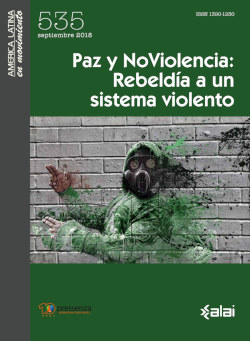“Argentina has left national defence in the hands of the Southern Command”
- Opinión

| Article published in ALAI’s magazine No. 535: Paz y NoViolencia: Rebeldía a un sistema violento 17/09/2018 |
Dialogue with Elsa Bruzzone, specialist in geopolitics, strategy and national defence, Secretary of the Centro de Militares para la Democracia Argentina (Cemida), and Honorary Consultant of Congress on strategic natural resources.
-The Argentine President Mauricio Macri has announced the use of the military forces in internal security operations, and we all grab our heads in dismay. We had assumed that, since this mandate is outside the law, it would remain as one of the many failed declarations of the President. Nevertheless, the Northern Border plan has been announced and part of the army will be under the orbit of the Minister of Security, Patricia Bullrich; and a plan for the relocation of troops is underway. Elsa, how can we understand this reorganization?
There are two reasons: internal and external. The external reasons are a response to the systematic request of the Southern Command, the military command created by the United States for the whole South American continent. The first military command was created in 1953, and is the armed wing of the famous Organization of American States (OAS), created in 1948. For some years, there have been repeated pressures on regional governments that make a clear division between security and national defence, for them to end this distinction in order to engage the armed forces in the struggle against the hypotheses of conflict that they say include: drug trafficking, terrorism, weapons of mass destruction, migration and natural disasters. But also social control of the population, surveillance over the population that might try to evade or generate instability, as they call it, with respect to the economic policies imposed by Washington.
The other reason is of an internal nature: since this social and economic model does not function without repression, and given the possibility that the security forces could be overcome by popular mobilization, by the resistance of our people, it is proposed that the armed forces be involved in internal security. Now, in reality, this violates the laws of defence and of internal security that can only be modified by the National Congress, and the Congress is the only body authorized to decide the role of the armed forces. But this move aims, above all, at the destruction of what a country’s armed forces are for. All armed forces, in whatever country of the world, have as their mission the defence of the territory against an external enemy state; or at times, as has happened in Iraq and Syria or is now happening in Yemen, against the mercenary forces created by the United States, NATO, Israel and the countries of the Persian Gulf, in those countries, where veritable mercenary armies have been created, which are the terrorist groups that are battering these countries.
So how is this process taking place?
As Argentina has left national defence in the hands of the Southern Command, it no longer needs armed forces. So they need to transform them into security forces. There are plans to send 3,000 troops of the army to the gendarmerie, to transform them into gendarmes. To this end, they have destroyed all economic production for defence, which is what would give us autonomy in defence. We therefore have the destruction of the Military Industries, of the aircraft factory, that of medium sized tanks, the Tandanor shipyards, the Rio Santiago Shipyard... They have told the armed forces that they will receive equipment, which is false, because the equipment that was purchased is 30 to 50 years old and is entirely recycled. In the case of the air force, the aircrafts purchased serve only for training, not to face an external aerial aggression; and they are once again being involved in the doctrine of national security, imposing the idea that the enemy is their own population.
We are living in a kind of offensive in our Latin American territory, in a dispute between economic and geostrategic military interests of the United States, and with those of the other great power today, China. There is a restructuring of this whole axis and a struggle to prevail with very belligerent unilateralism on the part of the United States; and this position is clearly focused on key areas of natural resources such as the Guarani aquifer, in Neuquén, near Vaca Muerta and the Chinese aerospace base; and there is also talk of the lithium in Jujuy and framing Bolivia as a possible enemy. What are they trying to generate?
The issue is that in the new security strategy of the United States, their principle enemies are China, Russia and Iran, but also Venezuela and Bolivia, because these two governments do not accept the conditions, nor do they kneel before Washington, as do the rest of the region’s governments. Hence, as these are their enemies, they are very preoccupied by the agreements that are being signed with China, but also the agreements that are signed with Russia; the presence of Chinese companies, as well as Russian companies in the continent and the possibility of agreements with Iran of some countries, such as Venezuela and Bolivia. This results in a new offensive to recuperate lost terrain. We have never ceased to be important to the United States; they appeared to be looking elsewhere but this does not mean that they were not taking us into account. Now the offensive has been installed to such an extent that governments elected by popular vote have lined up unconditionally with US objectives and, in the case of Argentina, also with Great Britain and the State of Israel. These carnal relations are no longer those of the 1990s, but we could say that they have been recharged, given several turns of the screw.
I imagine that this must be causing a lot of resentment within the army, since it goes against the values that motivate people close to the army. It is an affront.
There is a great deal of resentment, first and foremost because the present components of the armed forces and the army are no longer members, as formerly, of the local oligarchy, but citizens from the middle class, lower middle class, popular class, where the school curricula are democratic, where their teachers are also democratic, where they are formed in democracy. And in the case of the army, in 2006 they developed the project “The Argentine Army towards the horizon of 2025", which establishes that the country could be the victim of extra-regional aggression (alluding, without naming them, to Great Britain, NATO and the United States) for its natural resources; and for this reason establishes that there would have to be a complete restructuring, sending the regiments and all the personnel to those areas where there are natural resources in order to preserve them, but also to discourage attack by a foreign state. Hence, they have a very clear hypothesis of a real conflict over natural resources; but there are also the Malvinas Islands, the South Atlantic islands, the Antarctic, the Argentine Sea, unpopulated spaces. We should remember that, for the past 40 years, there is a project developed by the United States, Great Britain and France, in the United Nations Security Council, that in countries with unpopulated areas in their territories, these areas should be broken up, transformed into protectorates of the United Nations in order to settle environmental refugees there, that is, the inhabitants of island countries and coastal countries that will disappear due to rising sea levels.
Therefore, their hypotheses of conflict are very clear and now they see that no-one speaks of these hypotheses, that there are attempts to impose those determined by the United States, they see all the production for defence trashed and that they are being transformed into security forces, with a return to the national security doctrine, where the role of the armed forces is completely distorted. Internally there is great uneasiness, in addition to the return to carnal relations, since if there is one thing the army cannot forget it is the Malvinas, and they have not forgotten the aid provided by the United States to Great Britain when in reality they should have defended us due to the Inter-American Treaty of Reciprocal Defence.
There are also efforts to form a South American intervention force, made up of Brazil, Argentina, Peru, and Colombia, which Panama might join, and at some point Chile, with the objective of a military intervention in Venezuela, which was a permanent goal of Obama and now also of the Trump administration.
I understand that the army owes its obedience to the commander in chief that is the President.
Exactly. They will not stage a coup d’état. They will obey.
But, might they resist carrying out orders?
Yes, they could resist, but then they would have to retire or leave the forces.
We cannot expect a revolutionary action from the military?
In no way. This is a debate that we have held, it has to come from our people, since if we want a real project of national liberation in every sense, we would need to have the armed forces involved in the project. It would be necessary to have a civic-military union, which is the notion of the people or the nation under arms, that was what we did to become independent, that is what is making it possible, in Venezuela, to resist the internal enemies as well as those from outside. This combination has to come about, but this is a debate that we must resolve as a society. We must return to our roots. We must return to the roots of our independence and we must debate the project and how we shall bring it about. We must prepare ourselves to resist. This is something that we all owe ourselves if one day we really want to be independent, free, autonomous and sovereign. We must retake the route of the Revolution of May.
I think that this dialogue is very important, with partners who can come from the armed forces, the organizations that have to do with the army, the Navy...
I’m going to tell you something that my husband, the retired Colonel José Luis García always said to me. If General Perón, in his first two governments, had really involved the armed forces in the project and not left them out of politics, there would not have been a coup in June, nor in September 1955. He explained to me that the right and the oligarchy approached them and spoke freely with them, and filled their heads with ideas. When Perón returned, he recognized that, my husband said, but it was already too late, because the armed forces were already enthused with the doctrine of national security. But Perón realized that the error had been not to involve them in the project. And not involving them left the field open to those who were opposed to the project so that the oligarchy and the US Embassy had brainwashed them and transformed them into what they later became, carrying out civic-military coups and overthrowing constitutional governments.
(Translated for ALAI by Jordan and Joan Remple Bishop)
Mariano Quiroga is a popular journalist, part of the information team of Pichincha Universal radio (Ecuador), artistic director of Radio Hache in Buenos Aires and international editor of Pressenza.
Del mismo autor
- “Argentina has left national defence in the hands of the Southern Command” 17/10/2018
- “Argentina ha delegado la defensa nacional en manos del Comando Sur” 17/10/2018
- ¿La democracia terminó? 26/01/2018
- El empresarismo sociópata 14/03/2017
- Ernesto Samper: “La oposición venezolana debe comprender que el único camino de resolución es el diálogo” 25/07/2016
- Un gobierno acorralado por las corporaciones 03/02/2014

